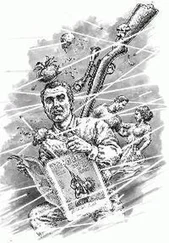Flint was always looking for the perfect woman — and always being disappointed. In romantic affairs he was as short-sighted as his own eyes — and he did nothing about either defect. He wouldn’t wear glasses and he wouldn’t learn by experience.
His latest “little number” was a blonde perfection, weighing about a hundred and ten pounds, somewhat top-heavy in her physical distribution, and with a pair of blue eyes that were like sultry lagoon-pools. She came into the ring listed as Lottie Larson, age twenty-eight (unsubstantiated by any birth certificate). And Flint was gone on her. For him she was the woman, and for her he was the man — as soon as he could, no matter how, produce a properly authenticated bank balance of £ 10,000.
At the time of this story, Flint had about £5,000 — which was high for him — and he was working on the balance. In fact, although he had taken Lottie on holiday to a small seaport town in Hampshire called Brankfold, Flint never missed a chance to pursue his calling — Flint was a man who always had both eyes open for the slightest tip of the head from Opportunity.
One day, driving by himself — Lottie had stayed in the hotel with a headache — he passed a large country house just in time to see a man and a woman and two children drive out of the main gates. Flint stopped up the road and then wandered back to the house. He went round to the servants’ entrance and knocked. If there had been any reply he would have tried to sell the cook a complete set of the Child’s Wonder Book of Nature , £14, delivered by post as soon as the check was cleared... But there was no answer to his knock.
So Flint went into the house through a convenient window, and wasting no time on reconnaissance he quickly found the study and the safe. It was a laughable safe to a man of Flint’s experience. He opened it up with a collapsible jimmy (which he always carried with him), and found himself with about £50 in notes and a small wash-leather bag of uncut diamonds. At a quick and happy glance he knew the diamonds would be worth about £20,000 from any fence.
Flint drove back to his hotel whistling and found that Lottie, according to the hall porter, had recovered from her headache and gone off to the Pier Ballroom to a tea dance. Now Flint, because of his wooden leg, was not much of a dancing man. However, for Lottie’s sake, he did his best. So he went after her, eager to show her the bag of diamonds.
Squinting around the ballroom, he finally picked out her blonde topknot. She was dancing with a man who, as far as Flint could see, was just a tall length of Donegal tweed with a black thatch on top.
Flint pushed his way across to them on the floor and took Lottie by the arm. It should be mentioned here that Flint was by nature a very jealous man where his “perfect women” were concerned — even though Flint knew that there were some limits to perfection.
Very politely Flint said, “Excuse me, the lady is tired” and started to lead his beloved away. But the face under the black thatch said to Flint, “The lady is not tired and is enjoying this dance with me. Stump off, you old pirate.”
Now this was a most unfortunate thing to say to Flint. Flint didn’t mind a bit being ribbed about his leg by members of the Minerva Club — but for any nonmember even to show he had noticed it, let alone draw a crude allusion to it, was like putting a match to a powder keg.
Flint let go a roundhouse and put the man on the floor; but the man jumped up to an accompaniment of shrieks from the dancers and a drum roll from the band, and flashed over a quick right cross to Flint’s jaw that dropped him to the floor as if he’d been shot After that there was a few minutes of sharp give-and take, during which Lottie disappeared, and then the police arrived. Flint and the other man were hauled off to the local police station — charge, disturbance of the peace.
Now on the way to the station Flint did some quick thinking. He knew that he would be up before the beak the next morning and he knew that with his record he would get at least a month — while the other fellow, such is justice, pleading he had been assaulted, would probably get off scot-free. The thought of a month didn’t worry Flint much. In his profession the calendar was always coming up with such temporary blanks — but, of course, he was worried about the diamonds.
At the police station he was bound to be searched and his belongings taken. In the end Flint did what any intelligent monkey would have done: he pouched the small wash-leather bag inside his mouth up against his right cheek and all through the journey he sat with his hand against his face as though he had got a swollen jaw in the fight.
It worked in front of the desk sergeant. Flint was relieved of all his possessions and went mumbling into the detention cell.
The next morning he appeared before the judge and tried to mumble his way out of the charge against him. Maybe, if Flint could have spoken up clearly, the beak would have given him only a month; but the beak was a bit deaf and Flint’s mumbles, though each one was over twenty carats in value, merely irritated him. Flint got a sentence of two months, and the other man was discharged.
Now the jail at Brankfold was a small one, adjoining the Chief Constable’s house — all one building, in fact. There were only eight cells, and business in Brankfold was never enough to fill them all. Flint was given a top-floor cell with a view of the sky and nothing to look forward to except visiting day when he knew that Lottie would be around.
Flint was aware, of course, that while he had got away with the swollen-face gambit, he could not keep it up for two months. Fat jaws just do not last that long and somebody would get suspicious. So he decided to unpouch the diamonds, hide them, and only pouch them again on the day he left jail.
Being a man of resource, he proceeded to unravel enough thread from his bed mattress to make a length of string. He tied the wash-leather bag to it, stood on his bed, and lowered the diamonds through the grille of the ventilator up in the corner near the ceiling, tying the other end of the string neatly and inconspicuously to the grille frame. Then he settled down patiently to do his two months. Sixty days and he would be out — with scads of money in the bank — and Lottie — and bliss forever-more.
On the first visiting day he told Lottie about the diamonds and about the splendid future that lay before them. Her eyes turned to limpid pools which promised exotic delights. She began to describe the kind of house she would like to live in, and the color she already fancied for the dining-room curtains.
Flint congratulated himself on his good taste in falling for a woman who was not only beautiful and shapely but such a magnificent home builder. The idea of home, it must be mentioned, was something very dear to Flint since he had never had one, having been found in a railway carriage when he was three and having flitted from then on through various institutions and remand homes to Borstal and, finally — the crowning achievement of his career — five years in Dartmoor. Yes, Flint was all for a home of his own — with his perfect woman.
But the next week, when Solly Badrubal came to see him, he was a bit shaken.
“To tell a woman you have a packet of diamonds stashed away is folly, Flint — sheer folly. She could sell you out just for the reward she could get for the return of stolen property.”
“Not Lottie — there is no such baseness in my Lottie.”
“Then she’s no woman.”
“That,” said Flint firmly, “is something I know to be untrue. Don’t you worry about Lottie. Just you get hold of a good fence and tell him I’m coming out with a packet and to have the money ready. I don’t want any delay in getting off on my honeymoon. Lottie is all for the Bahamas. She is going up to London next week to choose her outfit.”
Читать дальше








